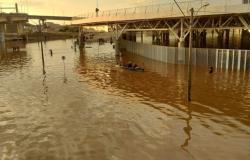Last month, a surprising incident occurred when a piece of space debris from the International Space Station (ISS) hit a man’s home in the US state of Florida. Although most of the debris from the discarded battery pack disintegrated upon re-entering Earth’s atmosphere or landed harmlessly in the Atlantic Ocean, one fragment managed to reach Alejandro Otero’s residence.
Thanks to publicity on social media, Otero connected with NASA, triggering an investigation that confirmed the origin of the object.
Read more:
According to the NASA statement, the debris was identified as a rack, a support bar used to mount batteries on cargo pallets on board the ISS. Composed of the metal alloy Inconel, the fragment weighs 1.6 pounds (about 726 g), measures 4 inches (10.16 cm) tall, and has a diameter of 1.6 inches (4.06 cm).
Despite expectations of burning up during reentry, the object maintained its structural integrity, traveling at an estimated terminal speed of more than 100 miles per hour. This speed facilitated its penetration through multiple layers of Otero’s house, culminating in its attachment to the ceiling of the first floor after passing through a tiled roof and a bedroom on the second floor.
Fortunately, no one was injured in the incident. Otero’s persistent attempts to contact NASA directly were unsuccessful until astronomer Jonathan McDowell intervened via X (formerly Twitter), catalyzing NASA’s response and subsequent recovery of the debris for analysis.
What to do if space debris lands on your house?
- Space debris striking a residential structure highlights the lack of established protocols for reporting such incidents.
- Although there are no official procedures, people who find fallen space debris are advised to notify their country’s space agency or local government.
- In response to the incident, Otero and his attorney, Mica Nguyen Worthy, are pursuing a claim for damages against NASA.
- Worthy emphasizes that the claim transcends mere compensation, serving as a catalyst for a broader debate about space debris mitigation and the responsibility of space agencies and private entities in managing orbital material.
- The proliferation of rocket launches and satellite deployments in recent years has increased the risk of accidents related to space debris.
- The probability of human fatalities resulting from falling space debris over the next ten years is 10%, with populations in the global south bearing a disproportionate burden due to the deployment of inoperative satellites over oceanic regions.
- Past incidents, such as the 2020 Chinese rocket accident in Ivory Coast and the recent Chinese rocket incident in China, highlight the global ramifications of uncontrolled space debris.
- Establishing international agreements on disposal protocols and delineation of responsibilities is imperative to mitigate the risk posed by falling space debris and facilitate compensation procedures for affected individuals.
Tags: Piece International Space Station crashes Florida home






